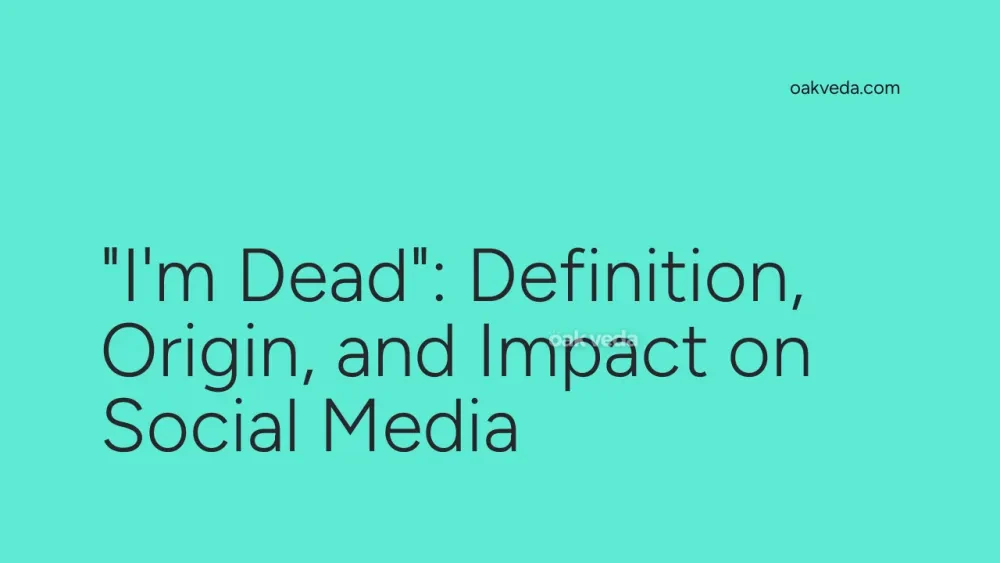
What is "I'm Dead"?
"I'm dead" is a popular slang expression used extensively on social media platforms to convey an intense emotional reaction. Contrary to its literal meaning, the phrase is not about actual death but rather an exaggerated way to express amusement, disbelief, or being overwhelmed by a situation or statement. When someone says "I'm dead" online, they're indicating that something was so funny, shocking, or surprising that it figuratively "killed" them with laughter or astonishment.
Origin and Development of "I'm Dead"
The exact origin of "I'm dead" as a slang term is difficult to pinpoint, but its usage gained significant traction in the early 2010s with the rise of social media platforms. The phrase evolved from similar expressions like "I'm dying" or "I'm deceased," which have been used colloquially for decades to express extreme reactions. As internet culture embraced more hyperbolic and dramatic forms of expression, "I'm dead" became a go-to phrase for users to convey their emotions succinctly and emphatically.
How "I'm Dead" Works
In online conversations, "I'm dead" functions as a reactive statement, often used in response to:
- Hilarious memes or jokes
- Shocking news or unexpected events
- Absurd or outrageous situations
- Impressive or mind-blowing content
The phrase is versatile and can be used in various forms, including:
- "I'm dead" 💀
- "Dead" 😂
- "Literally dead"
- "I'm deceased"
These variations all serve the same purpose: to communicate a strong emotional response in a concise, relatable manner.
Popular Examples of "I'm Dead"
The use of "I'm dead" is widespread across social media platforms. Here are some common scenarios:
- Commenting "I'm dead 💀💀💀" on a friend's hilarious TikTok video
- Replying "Dead 😂" to a witty tweet
- Captioning an Instagram story with "I'm literally dead" when sharing a surprising news article
- Responding to a shocking celebrity gossip post with "I'm deceased"
Impact of "I'm Dead" on Social Media Culture
The prevalence of "I'm dead" in online communication has significantly impacted social media culture:
-
Emotional Amplification: The phrase allows users to emphasize their reactions, making conversations more dynamic and engaging.
-
Community Building: Using common slang like "I'm dead" helps create a sense of belonging within online communities.
-
Content Creation: The popularity of the phrase has inspired countless memes, GIFs, and videos centered around the concept of being figuratively "dead" from laughter or shock.
-
Language Evolution: "I'm dead" exemplifies how internet slang rapidly evolves and becomes mainstream, influencing everyday language.
How Brands and Influencers Use "I'm Dead"
Savvy brands and influencers have incorporated "I'm dead" into their social media strategies:
- Relatable Content: Using the phrase in captions or comments to appear more authentic and in tune with their audience.
- Engagement Boosting: Encouraging followers to use "I'm dead" in response to their content, increasing interaction rates.
- Meme Marketing: Creating or sharing memes featuring the phrase to resonate with younger audiences.
- Product Promotion: Describing products or experiences as so amazing they'll leave customers "dead" (in a positive way).
Future Trends Related to "I'm Dead"
As social media language continues to evolve, we can expect:
- New Variations: The phrase may spawn new, related expressions or be replaced by even more hyperbolic statements.
- Cross-Platform Usage: While popular on platforms like TikTok and Twitter, "I'm dead" may spread to professional networks like LinkedIn as language barriers between personal and professional communication blur.
- International Adoption: Non-English speaking internet users may adopt the phrase or create equivalent expressions in their languages.
- AI Recognition: As natural language processing improves, AI-powered tools may better understand and interpret the contextual meaning of "I'm dead" in sentiment analysis.
FAQs about "I'm Dead"
Q: Is saying "I'm dead" offensive? A: Generally, no. In most contexts, it's understood as harmless slang. However, be mindful of using it in sensitive situations where it could be misinterpreted.
Q: Can "I'm dead" be used sarcastically? A: Yes, the phrase can be used sarcastically to indicate that something intended to be funny or shocking fell flat.
Q: Is "I'm dead" only used by younger generations? A: While it's more common among younger users, the phrase has been adopted across various age groups on social media.
Q: Are there cultural differences in using "I'm dead"? A: Yes, the phrase may be more prevalent in some English-speaking online communities than others. Always consider cultural context when using or interpreting slang.
In conclusion, "I'm dead" has become a ubiquitous expression in social media culture, reflecting the internet's penchant for dramatic and concise communication. As language continues to evolve online, this phrase serves as a prime example of how slang can quickly become an integral part of digital discourse, shaping how we express emotions and react to content in the fast-paced world of social media.
You may be interested in:

